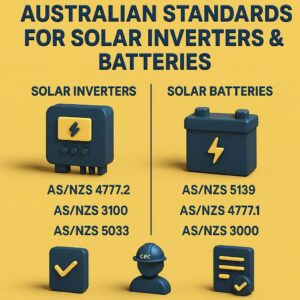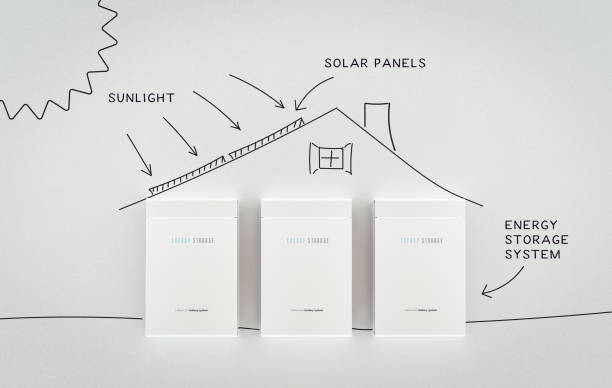The growth of solar energy in Australia has driven strong regulatory frameworks to ensure system safety, reliability & performance. Solar inverters and batteries must comply with Australian Standards (AS/NZS), and installations require certified professionals to maintain both legal and safety obligations. Below is an outline of the key standards, compliance expectations, and certification requirements for homeowners and businesses in Perth.
Key Standards for Solar Inverters
Solar inverters are central to converting DC power from solar panels into usable AC power. They are governed by strict standards, including:
- AS/NZS 4777.2 – Defines requirements for grid connection of energy systems via inverters, ensuring safe synchronisation and protection of the electricity network.
- AS/NZS 3100 – Covers general electrical equipment safety, ensuring inverter components meet Australian conditions.
- AS/NZS 5033 – Provides installation guidelines for photovoltaic arrays, including wiring and DC isolator requirements that relate directly to inverter safety.
Compliance with these standards ensures solar inverters in Perth and across Australia meet grid stability, power quality, and protection requirements.
Key Standards for Solar Batteries
Energy storage systems must follow equally strict requirements to ensure safety and performance:
- AS/NZS 5139 – The main standard for battery installations, covering lithium-ion and other chemistries. It sets requirements for location, ventilation, fire safety, and electrical protection.
- AS/NZS 4777.1 – Covers installation and grid connection of inverter energy systems that work in parallel with storage.
- AS/NZS 3000 (Wiring Rules) – Ensures the overall electrical installation, including battery integration, complies with national safety standards.
These rules are critical for minimising risks such as overheating, fire hazards, and electrical faults.

Compliance Obligations
System owners and installers must ensure that:
- All equipment is on the Clean Energy Council (CEC) approved products list.
- Installations are carried out by CEC-accredited solar installers.
- Compliance certificates are lodged with local electricity distributors and regulators.
- Regular inspections and maintenance follow manufacturer and regulatory requirements.
Failure to comply can void warranties, affect insurance coverage, and may even result in systems being disconnected from the grid.
Installation Certification
Only licensed electricians with CEC accreditation are authorised to design and install solar PV and battery systems. Upon completion, they must issue an Electrical Compliance Certificate and lodge it with the relevant state or territory authority. This guarantees the system meets both Australian Standards and local energy distribution requirements.
Conclusion
Adhering to AS/NZS standards is essential for ensuring solar systems are safe, efficient, and eligible for government incentives. Whether considering solar inverters Perth or a full energy storage solution like a solar battery Perth, working with accredited installers provides peace of mind, compliance assurance, and long-term system performance.

